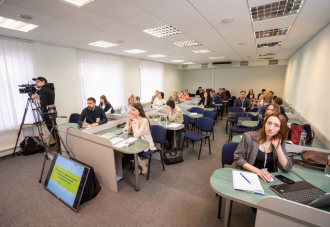Everyone in Ukraine and around the world can now see what a lack of public awareness and political culture can lead – based on the example of russia. So what can activists and volunteers do in the wartime to help spread the truth, in particular through foreign media?
The activities of civil society and independent media play an important role in raising the awareness of voters, no matter where they live.
In Kharkiv, the team from SMART MEDIA NGO has been working to raise the level of political culture of Ukrainians since 2019.
SMART MEDIA chose a super important issue: voters vote for slogans, do not understand the electoral system, do not analyze the programs of candidates, draw conclusions based on unverified news, do not know the powers of MPs and officials and do not take responsibility for their choice.
In 2020, SMART MEDIA took part in the Mentorship Program, subsequently coordinated the work of the Electoral Council UA in Kharkiv, and in 2021 the two-year project “Reforms for Citizens” was launched. All the activities of the organization is aimed at disseminating information and engaging citizens in activities.
Representatives of the organization are accustomed to looking for the most effective ways to work. We are talking about the publication of analytical articles, public discussions with politicians, creative activities for young people, interesting and simple materials to explain the powers of authority, videos, etc.
Oleksandra Shchukina, Chair of the Board of SMART MEDIA NGO (now a relocated organization), communications expert, co-founder of the SMART Reforms Coalition of NGOs in Kharkiv, and writer, continues to disseminate important information even after the evacuation.
A few opinions from an expert on how and why it is important to do this internationally.
Communication with the foreign media: why is this important?
From the first day of the war, Oleksandra Shchukina would speak daily on the Belsat TV channel, a channel of the Polish public broadcaster focused on Belarus.
Oleksandra would tell the international community about the realities of what was happening in Kharkiv at the time.
“I talked about the need for no-fly zone, and that we need to be supported. I was telling them about our government heroically fighting to prevent a humanitarian crisis in Kharkiv and other places of hostilities,” said Ms. Oleksandra.
1-2 times a day, the expert would speak live on the TV channel (until she was evacuated), even from bomb shelters: “I would sit in a bomb shelter, shine a flashlight in my face and talk about what was going on.”
According to Oleksandra Shchukina, it is important to carefully get the message across: “It is necessary to communicate very correctly what is happening in Ukraine so that international partners understand the importance of their support, as well as so that those who are abroad understand what is really happening – from primary sources.”
“We need to talk about our unity”
Oleksandra Shchukina gives her advice to organizations whose representatives communicate with foreign journalists: You need to understand that you are now speaking not on your own behalf, but on behalf of Ukraine.
“You need to say that we are all united now, that all our disputes have been set aside, that we are all working for victory – together with our president, together with our military authorities, volunteers, and NGOs, that we all stand united and we will win together,” Oleksandra is convinced.
The messages and meanings she conveyed in her speeches were similar to the messages of the head of the Kharkiv regional administration: “Now we need to show our unity, the unity of us all: authorities, citizens, NGOs. And to talk, of course, about the horrors that are happening, and to ask [foreign] partners to continue to support us and lobby for this – as best they can – with their authorities.”
Where to find reliable information for communication with foreign media
If you and your organization have the opportunity to disseminate news about the real state of affairs in Ukraine to foreign media amid the war – we suggest checking out some links:
- Verkhovna Rada of Ukraine’s official channel in English: Telegram, Twitter.
- Office of the President of Ukraine on YouTube(including recordings of the President’s appeals to the peoples of the world).
- The Ministry of Foreign Affairs of Ukraine: Facebook, Twitter,
- Center Countering Disinformation: Facebook, Telegram, Twitter.
- Materials of the Ukraine Media Center on YouTube.
- The Centre for Strategic Communications and Information Security: Facebook and videos on YouTube in English.
- Breaking news on the YouTube channel Ukrainian Military TV.
- Glossary of correct terminology to cover the Russian-Ukrainian war.
- How to cover military aggression. Recommendations from media experts.
- Covering the conflict: A practical guide for journalists..



